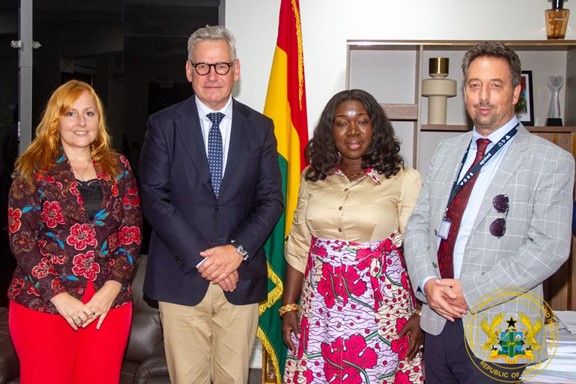The Minister for Trade, Agribusiness and Industry, Mrs. Elizabeth Ofosu-Adjare, has on Thursday, November 20, 2025, held a series of high-level meetings with the British High Commissioner, EU Ambassador, and the UNIDO Country Coordinator, all aimed at strengthening partnerships in trade, investment, industrialisation and private-sector growth.
EU Pledges Stronger Investment Support
The EU Ambassador to Ghana, Mr. Rune Skinnebach, paid an introductory visit to the Minister, where he outlined the European Union’s renewed focus on interest-driven partnerships centred on investment, sustainable economic development and value addition.
He highlighted the EU’s €150 billion Global Gateway investment package for Africa, designed to mobilise development financing and private capital into high-impact projects. The Ambassador stressed that Ghana must position itself competitively to attract these investments, noting that the EU remains Ghana’s largest export market, donor and investor.
Mrs. Ofosu-Adjare commended the EU’s longstanding partnership and reaffirmed Ghana’s commitment to creating a supportive business environment.
She detailed her interventions to assist industry—describing herself as a “pro bono lawyer for industry”—and cited recent collaboration with the Bank of Ghana to extend export proceeds repatriation timelines from 60 to 120 days.
Both sides agreed to intensify engagements between the Ministry, the EU Delegation, and the European business community to unlock new investment opportunities.
UK, Ghana Explore New Partnership and SME Financing Support
The British High Commissioner, Dr. Christian Rogg, also paid a courtesy call, during which discussions centred on unlocking more UK investments in Ghana, improving SME financing, and reviewing progress under the UK–Ghana Trade Partnership Agreement.
The minister emphasised Ghana’s political stability and its focus on job creation, noting the urgent need for grant support and accessible capital for micro, small and medium enterprises. She explained that while training has been extensive, the lack of funding continues to limit SME growth.
Dr. Rogg highlighted ongoing support from British International Investment (BII), which manages financing facilities aimed at lowering costs and crowding in private investment for growing enterprises.
The High Commissioner also sought updates on proposed reforms to the GIPC Act, particularly the removal of minimum capital requirements for foreign investors.
The Minister confirmed that the reforms have passed Cabinet and are undergoing broad stakeholder consultations. He further proposed formalising UK–Ghana economic cooperation under a structured “Growth Partnership”, which the Minister strongly welcomed.
UNIDO On Ghana’s Industrial Park Agenda
In another engagement, the UNIDO Country Coordinator, Mr. Eric Gyenin, briefed the Minister on UNIDO’s upcoming participation in a major Industrial Conference in Saudi Arabia and an upcoming technical mission to Ghana aimed at deepening collaboration on industrial development.
Mrs. Ofosu-Adjare revisited her earlier proposal to develop a 500–1,000 acre industrial park, an initiative first discussed with Japanese investors, and expressed interest in securing UNIDO’s technical and institutional support.
She requested that UNIDO engage its Headquarters to explore areas of collaboration, especially regarding assessments, feasibility studies, project structuring and investment promotion.
Mr. Gyenin reaffirmed that UNIDO stands ready to provide technical expertise, industrial diagnostics, policy support and global partnership facilitation to advance Ghana’s industrialisation agenda.
These high-level engagements underscore Ghana’s renewed drive to attract investment, boost industrialisation, strengthen SMEs and deepen global economic partnerships under the leadership of Hon. Elizabeth Ofosu-Adjare.


